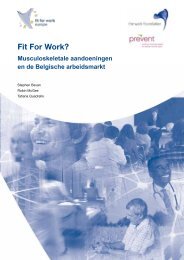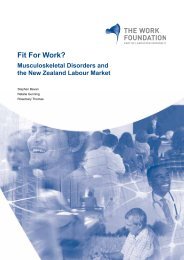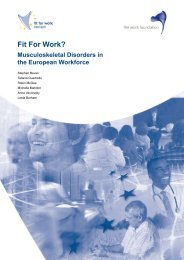FfW Bulgarian report (English language) - Fit for Work Europe
FfW Bulgarian report (English language) - Fit for Work Europe
FfW Bulgarian report (English language) - Fit for Work Europe
You also want an ePaper? Increase the reach of your titles
YUMPU automatically turns print PDFs into web optimized ePapers that Google loves.
Further indirect costs of disability result from the impact of long-term health conditions on<br />
an individual’s ability to participate in the labour market. Only 13 per cent of disabled people<br />
are employed in paid jobs. An additional 8 per cent are in subsidised jobs (ANED, 2007). At<br />
the same time, Ministry of Labour and Social Policy (MLSP) <strong>report</strong>s cases of people illegally<br />
obtaining disability status in order to retire early, as they feared not being able to find a job<br />
due to old age or illness (NSSI, 2011a). Artificially inflated numbers of people with partial or full<br />
incapacity adds to the burden of disability on the <strong>Bulgarian</strong> welfare system and the economy<br />
Financial support is available to people with disabilities, however the size of allowance is not<br />
always sufficient to support individual needs. 32 NSI surveyed 3,000 people of working age, who<br />
<strong>report</strong>ed having a disability. Disability pensions are the main source of income <strong>for</strong> 72 per cent<br />
of the respondents, 8 per cent rely on support from another person, and only 8 per cent receive<br />
salary <strong>for</strong> work or pension from work (ANED, 2007). These figures indicate that incapacitated<br />
people are under a high risk of poverty.<br />
At the same time, some people with disabilities are eager to return to the labour market in the<br />
context of financial hardship. Almost a third of the respondents in the NSI (2005) survey thought<br />
that they could do certain types of work. However, disability assessments that do not take into<br />
consideration preserved abilities of people may compromise their chances of finding work. 33<br />
In addition, some people with disabilities are either unaware of or discouraged from accessing<br />
assistance with return to work.<br />
Rehabilitation services are in place in Bulgaria to support disabled people to return to work.<br />
However, a 2005 study of disability in Bulgaria has found that only 6 per cent of employed<br />
people with disabilities receive on-the-job support, while 16 per cent admitted having such<br />
a need (NSI, 2005). Of all people requiring support, only 5 per cent found their workplace<br />
accessible.<br />
The <strong>Bulgarian</strong> Agency <strong>for</strong> Disabled People 34 receives an annual budget to finance workplace<br />
adaptations <strong>for</strong> disabled people on the job at the maximum level of 7500 BGN <strong>for</strong> physical<br />
access to the workplace; 2,500 BGN <strong>for</strong> adjustments on the workplace and 6,000 BGN <strong>for</strong><br />
equipment at the workplace, regardless of the individual needs of the disabled people. There<br />
was no personal assistance or transportation allowances <strong>for</strong> disabled employees (<strong>Bulgarian</strong><br />
Agency <strong>for</strong> Disabled People, 2011).<br />
32 Expert interview<br />
33 Expert interview<br />
34 See http://ahu.mlsp.government.bg/<br />
Interventions<br />
<strong>Fit</strong> For <strong>Work</strong>? 47







